(text and background only visible when logged in)
January 2026 - New Year, New Focus
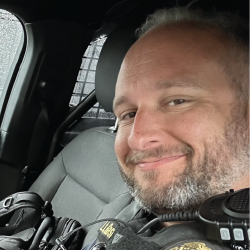
Lt. Charles Gaston
Training Division, Special Response Team
Georgia Tech Police Department (GTPD)
Length of service at Georgia Tech: 16 years
Xinia Richards
Travel and Expense Manager
Procurement and Business Services
Length of service at Georgia Tech: 3 years

Denise Johnson-Marshall
Director of Equal Opportunity and ADA Compliance/ADA Coordinator
Office of Equal Opportunity, Compliance, and Conflict Management
Length of service at Georgia Tech: 24 years
As we begin the new year, what’s one professional goal or focus you’re excited about in your role?
Lt. Charles: I serve as the Field Training Coordinator at GTPD. As such, I am responsible for the on-boarding and training of new police officers. A professional goal that I have for the new year is establishing and developing working relationships with two new police academies in the metro Atlanta area that we are starting to use. This expansion of my professional network has exciting potential to improve my own skills as an instructor.
Xinia: I am excited to continue supporting Business Services (Travel and Expenses) by contributing innovative ideas that strengthen compliance with policies and procedures while effectively supporting campus units.
Denise: Our ADA compliance team is committed to strengthening partnerships that promote accessibility. This year, our primary focus is to support departments and individuals during the early stages of developing policies and practices that could affect people with disabilities.
What’s something new—an idea, perspective, or habit—you’re bringing to your work this year?
Lt. Charles: A new perspective that I am trying to embrace this year is always keeping the big picture in mind. I am usually a very detail oriented person, which can be very helpful, but it is easy to loose sight of your role in the overall organization if you get too focused on the details.
Xinia: I am committing to being more open-minded and a better listener, while also making a conscious effort to express appreciation by saying “thank you” more often.
Denise: I’m excited to see multiple departments coming together—sharing resources, talent, and expertise—to advance digital accessibility compliance at Georgia Tech. This collaborative effort reflects the dedication of many individuals who have invested significant time to ensure the Institute has a clear, unified approach to providing effective communication for students, faculty, staff, and visitors.
What are you most looking forward to in the year ahead, either within your team or across A&F?
Lt. Charles: As part of my responsibilities within the Training Division at GTPD, I help teach our Citizen's Police Academy. We are currently updating the curriculum for the CPA for this semester and I am very excited for the changes we have in store. We usually have several attendees from across A&F, and I am looking forward to meeting more of you!
Xinia: I am most looking forward to supporting my team by ensuring access to reliable resources that promote consistency in our audits and provide strong, dependable support to campus units.
Denise: I have discovered that it is better to take some time to respond rather than to immediately react to stressful situations. Offering a well thought out response gives your emotions time to breathe and allows for more concise communication.
(text and background only visible when logged in)
November 2025 - Perspectives on Gratitude

Tiara Ball
Administrative Professional
Infrastructure and Sustainability
Length of service at Georgia Tech: 5 years
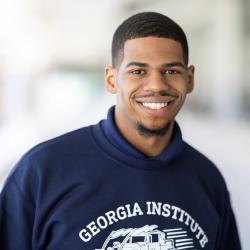
Michael Jones
Assistant to the Vice President and
Chief Human Resources Officer
Georgia Tech Human Resources
Length of service at Georgia Tech: 1 year
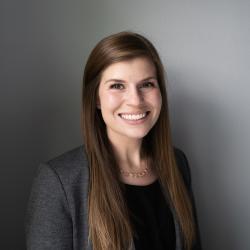
Hannah Gulledge
Program Manager
Infrastructure and Sustainability
Length of service at Georgia Tech: 2.5 years
What is one thing — big or small — that you are most grateful for in your work at Georgia Tech?
Tiara: I’m grateful for the professional growth and supportive community at Georgia Tech. The strong talent and professionalism around me have helped me grow in meaningful ways.
Michael: I’m grateful that my role allows me to meaningfully support people. Working closely with our chief human resources officer (CHRO) and deputy CHRO has shown me the positive impact strong administrative support can have, and I value the connections I’ve built across Georgia Tech Human Resources (GTHR). Administrative excellence has been my focus this year, and I’m thankful that my work helps our team operate with clarity, care, and efficiency.
Hannah: One of the things I’m most grateful for at work is my colleagues. Over time, I’ve had the privilege of connecting with individuals across Infrastructure and Sustainability and learning not only about the incredible work they do to serve the Institute, but also about who they are as people. These relationships have made my experience more meaningful, and they are a big part of why I enjoy coming to work each day.
How do you or your team show appreciation or support for one another?
Tiara: I show appreciation through words and acts of service. I truly believe teamwork divides the task and multiplies the success.
Michael: Our team shows appreciation through our “Show Your L.O.V.E.” acknowledgments, recognizing colleagues who live our values each day. We also uplift one another through monthly open forums where shout-outs are encouraged and everyone has a chance to celebrate great work and collaboration across GTHR. These moments help us stay connected, appreciated, and aligned with the values we strive to live every day.
Hannah: Our team shows appreciation and support by building real connections and bringing a sense of humanity into our work. We understand that while we all have responsibilities, we approach them with respect, flexibility, and a willingness to help each other when needed. We make it a point to celebrate achievements and take time to recognize wins — big and small — because hard work deserves to be acknowledged and commended.
Can you share a moment this year that made you feel especially proud or thankful to be part of the A&F community?
Tiara: I’ve had many moments over the years that made me think, “I did that,” but being selected for this year’s A&F Staff Profiles is what makes me most proud and grateful.
Michael: Participating in the ASPIRE Leadership Challenge was a standout moment. Representing A&F in that cohort was meaningful on its own, but what truly stood out was seeing so many A&F colleagues show up at the celebration to support all of us. Watching our community come together — cheering, encouraging, and uplifting one another — reminded me how deeply we value growth, connection, and shared success. It was a powerful example of the support that runs through A&F, and I felt truly grateful to be part of it.
Hannah: It’s hard to pinpoint just one moment that makes me grateful to be part of the A&F community since there are so many. Since joining Georgia Tech over two years ago, I’ve had the privilege of working with individuals across multiple A&F units—and one thing has remained constant: I’m always met with consistent, genuine support. Before Georgia Tech, I created magic at Disney—here, the magic comes from how we combine our expertise to make meaningful impact together.
(text and background only visible when logged in)
October 2025 - Spotlight on Cybersecurity
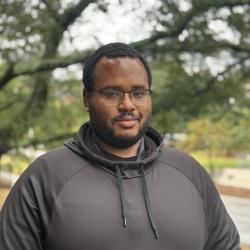
Michael Gibson
Help Desk Technician
Administrative Services Center
Length of service at Georgia Tech: 2 years
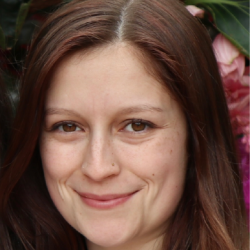
Cassie Coberly
Digital Learning Support Specialist
Georgia Tech Human Resources
Length of service at Georgia Tech: 1.5 years
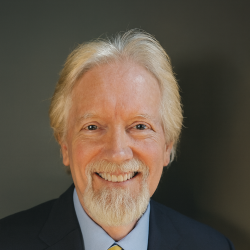
Eric Gill
Manager, IT Training
Office of Information Technology
Length of service at Georgia Tech: 11 years
How does cybersecurity – or protecting digital assets – factor into your day-to-day work?
Michael: In my role, we handle a wide range of calls from across campus, including account access issues, technical support, and reports of suspicious activity such as phishing emails or unexpected push notifications. Our team works to gather information during potential cyber threat events, ensuring that all members are informed and able to quickly isolate and resolve issues that may impact the organization.
Cassie: In my current role, one of my responsibilities is ensuring that each employee, and often students as well, has the appropriate level of access needed to either participate in their own learning or deliver learning experiences to others. This includes safeguarding personally identifiable information (PII) and training records by ensuring it’s only accessible to those with a legitimate need. Additionally, I often collaborate with our partners in the Office of Information Technology (OIT) to monitor the health of our systems and ensure compliance with both federal and institutional policies, as we navigate the ever-changing landscape of data protection.
Eric: As OIT’s cybersecurity training manager, I am responsible for advancing cybersecurity awareness at Georgia Tech. I design and implement training programs and lead campus-wide initiatives to ensure that safeguarding digital assets is a shared responsibility. My focus is on empowering faculty, staff, and students to recognize and respond to cyber threats effectively.
Can you share one cyber risk or threat you see often in our environment, and how you or your team help mitigate it?
Michael: One of the main cyber threats we encounter is phishing. These attempts can target anyone from faculty to students, so we remain on the lookout for suspicious emails or phone calls reported by users. By sharing information promptly across the team, we help raise awareness and prevent further spread. Gathering as much information as possible in coordination with other team members, we can quickly isolate the source and restore access to those impacted.
Cassie: The cyber risk or threat I see most often here at Georgia Tech comes from the inside – meaning we unintentionally put ourselves at risk by clicking on suspicious links, using weak passwords, or sharing sensitive information in unsecured ways. To help mitigate these risks, my team and I collaborate with OIT Cybersecurity and the Office of General Counsel to ensure both the New Hire Learning and Biannual Compliance Training include current, relevant cybersecurity guidance, empowering everyone to make safer choices online.
Eric: Phishing is one of the most frequent threats in our environment. To address this, we provide regular cybersecurity awareness training, conduct simulated phishing exercises using the KnowBe4 platform, and maintain resources such as the Cybersecurity GT Phishbowl. We also collaborate with OIT communications to promote October’s Cybersecurity Awareness Month through multiple channels.
What’s one piece of advice or tip you’d give to a colleague (or family member) to stay safer online?
Michael: If a link looks suspicious, do not click on it. If you receive a 2FA push notification that you did not initiate, deny it immediately. Remember, you are the first line of defense against unauthorized access to your account. If you receive a link from someone you know but aren’t sure it’s legitimate, contact them through another method to verify. At Georgia Tech, you can always forward any suspicious messages to phishing@gatech.edu for confirmation and peace of mind.
Cassie: My one piece of advice is to pause before you click. Whether it’s a link in an email, a text message, or something you find while browsing, it’s worth checking the sender and reviewing the website address first. If something feels off, it probably is. Consider reaching out to a colleague before moving forward.
Eric: My primary advice is: “Stay skeptical and verify before you click. Do not click on any link or file received via text, email, or voicemail without verifying its legitimacy through a trusted method.” Cybercriminals often exploit trust to gain access to credentials. I encourage everyone to remain vigilant and verify before clicking, both professionally and personally. I regularly share updates with family and friends on emerging threats to reinforce this message.
(text and background only visible when logged in)
September 2025 - Teamwork in Action
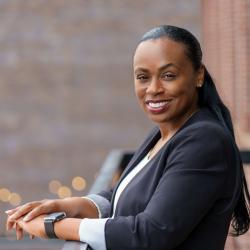
Natasha Parker
Associate Director, Portfolio Management
Office of Real Estate Development
Length of service at Georgia Tech: 13 years
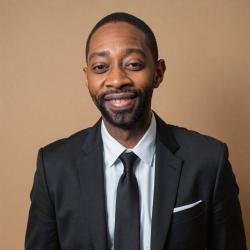
Sergio Evans
Resnet Manager
Office of Information Technology
Length of service at Georgia Tech: 7 years
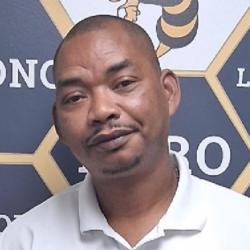
Joe Garrett
Custodial Supervisor
Infrastructure and Sustainability
Length of service at Georgia Tech: 11 years
What does “teamwork” mean to you in your day-to-day role?
Natasha: In my role, teamwork is about building strong relationships and keeping communication open across the Office of Real Estate Development and the broader campus community. A lot of what I do involves coordinating with different groups—faculty, staff, tenants, and partners—so being able to listen, share information clearly, and find common ground is key. For me, teamwork means making sure everyone feels supported and moving in the same direction, even when priorities compete.
Sergio: My role involves ongoing communication with various departments and teams, and these conversations help shape the strategic direction I provide. Collaboration is at the core of our work—balanced leadership and thoughtful input from others enable us to deliver strong, reliable IT support to a growing community of students and staff.
Joe: Teamwork means everything to me! Coming together to complete the day-to-day tasks at a high level while providing quality service to our customers is why we’re here.
How do you “go the extra mile” for the Georgia Tech community?
Natasha: I go the extra mile by thinking beyond just the transaction or the lease and looking at how our real estate decisions affect the campus experience long-term. That might mean negotiating savings that can be redirected to other needs, solving problems behind the scenes so tenants and partners never feel the disruption, or making sure a space is not only functional but welcoming. At the end of the day, my goal is to make Georgia Tech’s portfolio work harder for the people who use it.
Sergio: I naturally aim to exceed expectations. One of the ways I apply this to my role at Tech is by serving as a consistent and flexible resource during a wide range of hours. Whether it’s jumping into an interdepartmental meeting at 10 a.m. or helping troubleshoot a support issue at 9 p.m. I make myself available because I genuinely care about keeping things running smoothly for the community.
Joe: In addition to supervising one of the best teams at Georgia Tech, I assist the operations managers with emergencies, last-minute projects, and oversee the in-house window cleaning team. I make myself available for those unexpected moments when support is needed.
If your job were a sport, what would it be — and why?
Natasha: If my job were a sport, I’d say it’s more like basketball. You’ve got to keep your head on a swivel, anticipate where the ball is going next, and balance offense and defense at the same time. There are a lot of moving pieces—leases, budgets, facilities, partnerships—and success depends on timing, coordination, and making the right play for the team. Like basketball, it’s fast-paced and constantly shifting, but when it all comes together, it’s really rewarding.
Sergio: Rowing! Balancing relationships, leading groups, and overseeing support is all about rhythm and endurance. Just like a rower who must time each stroke with precision, I try to execute each task or project with focus while staying ready for the next challenge. It’s a constant flow of effort, recovery, and forward motion.
Joe: Football! Every team member knows their role and responsibilities. We show up every day to perform at our best. If a teammate is falling behind, we lift them up. The outcome may not be a championship ring, but it builds a champion mentality.
(text and background only visible when logged in)
August 2025 - What I Learned Starting Out at Tech
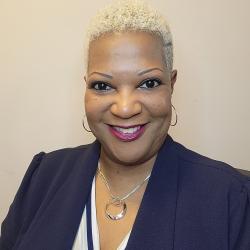
Yolanda McDaniel
Benefits Manager
Georgia Tech Human Resources
Length of service at Georgia Tech: 11 years

Sgt. Josh Strully
Georgia Tech Police Department
Length of service at Georgia Tech: 15 years
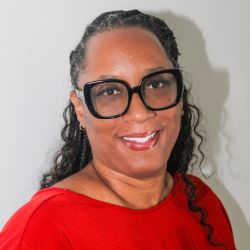
Pamisa Scott
Senior Clear Compliance Coordinator
Office of Equal Opportunity, Compliance, and Conflict Management
Length of service at Georgia Tech: 1 year
What’s one piece of advice you’d give to someone just starting their journey at Georgia Tech?
Yolanda: Keep an open mind and be willing to step outside your comfort zone. Opportunities are everywhere, and you may discover talents or interests you never imagined. Take advantage of the many engagement opportunities and organizations available—they can introduce you to new perspectives, connections, and career paths you didn’t know existed.
Josh: Run toward challenges, not away from them: I’ve spent a lot of time here at Tech – first as a student (STaC 2010) and then as a police officer (15 years this September!) – and I’ve learned that you can’t run from challenges or opportunities. Sure, it’s okay to take a step back to evaluate, but don’t back down. Georgia Tech can be tough, but so are you!
Pamisa: Take a deep breath and embrace the journey ahead; you belong here. Georgia Tech can feel big and fast-paced at first, but it’s also a place full of opportunity, discovery, and connection. Be curious, stay open to learning, and don’t hesitate to ask for help along the way. Every relationship you build here has the power to shape your experience and open doors you never expected.
Is there something you wish you had known on your first day here?
Yolanda: Not necessarily something I had known, but something that existed. I wish I had been able to tour the campus as a new hire. Georgia Tech is a large and beautiful campus, and I’m only now getting the chance to explore its many buildings, green spaces, and hidden gems. So, if you can, take advantage of the New Employee Experience – it offers a great tour of campus – or take the time to explore on your own. You will be amazed at what you discover.
Josh: You are not alone: Early on in my time as a student here I struggled adjusting to college life, but then I built up a good support system of friends and classmates. Throughout my career with GTPD, it’s only been reinforced that you never have to tackle a problem alone. Rely on and trust those close to you and support them as well.
Pamisa: On my first day, I wish I had known just how deeply collaborative the Georgia Tech family is. The success of almost all my projects as the Clery compliance coordinator relies on strong cross-campus partnerships. It wasn't until I started building those relationships that I saw how much easier it made my work. Looking back, I know that understanding this from the start would have made my transition far smoother.
What’s helped you feel connected or supported at Georgia Tech?
Yolanda: What’s helped me feel connected and supported at Georgia Tech has been my involvement in various activities within my department and on campus. Being a member of the Staff Council has also provided a strong sense of community and belonging. Additionally, I’ve been fortunate to work with great leaders who truly support and value the work I do.
Josh: Being part of something bigger: Whether it was taking in a football game with 40,000 other Yellow Jackets or the decision that led me into policing, being a part of something bigger than myself has always helped drive me forward and pushed me to be my best. I’ve wanted to help people my whole life, and my unique role in the Georgia Tech community has worked to fulfill that to no end.
Pamisa: The most powerful connection I've felt has come from understanding the network of shared responsibility that exists here. It's not just about one office or one person being "in charge" of safety. It's about how different departments (from student life to facilities to law enforcement and many others across our campuses) collaborate to build a comprehensive safety net. My feeling of support comes from knowing that the work I do, no matter how specific, is part of a larger, collective effort to ensure a transparent and safe environment for everyone.
(text and background only visible when logged in)
July 2025 - Reaching New Goals
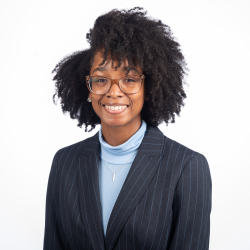
H’Laya Hill
Budget Analyst
Institute Budget Planning and Administration
Length of service at Georgia Tech: 1 year and 10 months

Christian Birk
Manager, IT Engineering
Administrative Services Center
Length of service at Georgia Tech: 20 years
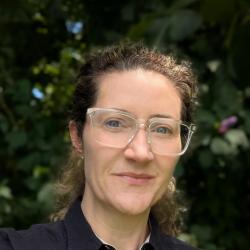
Kimberly Short
Director, Financial Systems
Institute Budget Planning and Administration
Length of service at Georgia Tech: 5 years
What is a milestone or goal you have reached so far this year?
H'Laya: This year, I led the development and implementation of a new naming convention for cost centers across campus – designed to bring greater consistency and organization to various systems (i.e., OneBudget, Workday) used by our financial personnel. Not only does it provide a seamless view for reporting, but it is also easier to locate where each cost center belongs in the Institute because of the logic behind the name and abbreviations. This achievement marks an important step forward as we prepare for the transition to Unified ERP.
Christian: Starting in early 2024, Georgia Tech requested AV Services' partnership in a strategic initiative to convert select event spaces to fully enabled instructional spaces. From initial site walks, to determining which spaces to convert, to deploying full AV upfits, the AV Services Design and Project Management Team has collaborated with Institute Planning stakeholders to outfit the appropriate AV technology in those spaces. As of July 2025, AV Services has successfully deployed the last AV system for this conversion to classroom use initiative.
Kimberly: One milestone I’m especially proud of this year is the success of CPF Bot—a tool I developed last year to analyze Change Position Funding (CPF) transactions in OneUSG Connect. Since going live last fall, CPF Bot has approved over 10,000 CPFs! While that number is a clear achievement, what I’m most proud of is earning the trust of the Commitment Accounting team. Gaining their support and demonstrating the bot’s potential were critical to the project’s success. Without their buy-in, CPF Bot likely wouldn’t have moved beyond the idea stage. I also want to recognize Dan Zealy (Manager, Intelligent Automation) and the robotic process automation (RPA) group—their collaboration was invaluable.
What accomplishment (big or small) are you especially proud of?
H'Laya: I’m incredibly proud of how much I’ve learned about Georgia Tech’s budget and planning process and even more so of how I’ve been able to apply this knowledge in meaningful ways. Budgeting and planning is a cornerstone of the Institute’s financial health, especially during times of uncertainty. I’m grateful to have become a trusted resource for my units across campus as my responsibilities continue to grow. I owe much of this progress to the support and guidance of my colleagues in Institute Budget Planning and Administration.
Christian: I am especially proud of the fact that Georgia Tech has entrusted the AV Services Design and Project Management Team with the responsibility of managing the audiovisual design, contracts and suppliers on large scale and highly visible initiatives such as The D.M. Smith building renovation and the Tech Square 3 building projects. This milestone is a tangible and direct result of the team's professionalism, collaboration, dedication, and alignment with Georgia Tech's strategic vision. The work we do every day helps drive innovation, cost efficiency, and AV excellence campus wide.
Kimberly: One accomplishment I’m especially proud of this year is the launch of the Notorious EBG (“Everything But Grants”)—a Workday workbook that consolidates both actual and projected budgets and expenses for all non-sponsored worktags within a unit. Although my role in this project was relatively small, I was thrilled to support the outstanding work led by Julia Thomas from Institute Finance Support and Chris Cho from the Office of Information Technology (OIT). Their leadership was key to bringing the Notorious EBG to life. The workbook has been well received across campus, and we were honored to present it at Workday’s Southeast Regional User Group conference earlier this year. We’re now developing a companion workbook to support grant management, which we hope to release to campus soon.
What do you look forward to in the second half of the year?
H'Laya: As the new fiscal year begins, I’m excited to continue supporting my units and contributing to initiatives and projects which promote consistency and organization. Lastly, I remain committed to deepening my understanding of budget planning and making a meaningful impact wherever I can. I am eager to keep learning, growing, and adding value across the Institute.
Christian: I'm excited that our team is finally bringing the AV systems and environment to D.M. Smith that it has long deserved. I'm also looking forward to the addition of an elevator—something we've needed for years. Before the renovation, we had to hand-carry heavy AV equipment up and down the building’s floors, which was no small task. In addition, I am excited to see AV systems in Tech Square 3 being built after years of planning and design. It is a joy to know that our team played a significant part in helping this landmark building come alive.
Kimberly: I'm excited to kick off another automation project—this time, a collaboration between Institute Budget Planning and Administration, the Office of the Controller, and OIT to automate the creation of worktags in Workday. After consulting with the Office of the Controller —who also manage worktag creation—we were able to design a single, streamlined automation that serves both of our offices. This solution is expected to save analysts hundreds of work hours each year. Even better, if the automation performs as expected, we’ll be able to repurpose it for the Unified ERP implementation of Workday. What excites me most is the potential for future collaborations with the Office of the Controller. My counterpart there, Serena Simpson, shares my passion for innovation and efficiency.
(text and background only visible when logged in)
June 2025 - Keeping Campus Safe
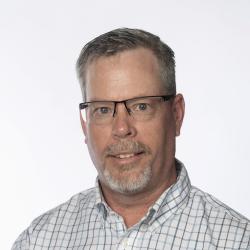
Jeremiah (Jerry) Young
Landscape Project Manager
Infrastructure and Sustainability
Length of service at Georgia Tech: 19 years
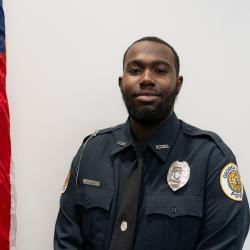
Abdoulaye Sarr
Police Officer
Georgia Tech Police Department
Length of service at Georgia Tech: 1 year and 9 months
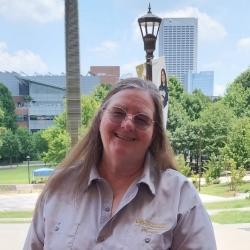
Vanessa Keel Biggers
Hazardous Materials Manager
Environmental Health and Safety
Length of Service at Georgia Tech: 2 years and 9 months
How does your role contribute to a safer campus community?
Jerry: Part of my job is to utilize findings from an ADA compliance study as a guide for improving and reconstructing outdoor areas such as plazas, streetscapes, and walkways – really any outdoor green space that is utilized by the campus community. Once construction begins, I help ensure safe access (and sometimes alternate routes) is available to areas affected by this construction.
Abdoulaye: My role as a police officer helps maintain security of the campus as well as students, staff, and visitors. When students and staff see us actively working in our vehicles, it provides peace of mind and reinforces our role as dedicated stewards of their safety. Our presence alone is a deterrence for the outside element that means harm to campus safety and that is invaluable.
Vanessa: As part of the Hazardous Materials Team, I help ensure a safer campus by leading a team who collects and manages chemical, biological, and universal wastes generated throughout the main Georgia Tech campus and satellite campuses. By safely removing these materials from labs and facilities and handling them in accordance with state and federal regulations, we reduce risk and support a healthier environment for everyone.
What’s one safety tip or practice you want more people to follow – and why?
Jerry: There is a lot a safety information that is provided by Infrastructure and Sustainability regarding campus construction. It is important to stay connected to this information and plan to help avoid a lot of the transit issues we often encounter. View construction updates here.
Abdoulaye: One safety tip I want everyone to follow is vigilance and awareness of their surroundings. While our campus is a safe place, safety is a shared responsibility. Everyone can help by staying aware, looking out for one another, and keeping an eye on their personal belongings to reduce the chances of harm or theft. Vigilance and awareness help to minimize the opportunity of crime on campus.
Vanessa: We encourage everyone to maintain a detailed log for each laboratory waste collection container. Knowing which chemicals and their concentrations are in liquid and solid wastes allows us to manage it more safely and effectively, protecting not only our team but also those involved in the downstream waste management process.
Can you share a moment when safety made a meaningful difference in your work?
Jerry: A few years ago, a visually impaired student reached out to her professor about her challenge to safely cross two campus locations on Atlantic Drive. The professor reached out to us, and we were able to install an audio prompt system which alerted pedestrians when they were able to safely cross the street. That student emailed me and thanked us for providing her with a way to safely navigate her way to class while maintaining her independence.
Abdoulaye: A moment when safety made a meaningful difference in my job was during a series of thefts on campus. Students and staff responded by taking extra precautions, such as securing their belongings—especially locking car doors in campus parking areas. This increased vigilance helped deter criminal activity by making it clear that our campus is not an easy target. When thefts did occur, students and staff were quick to notice when something was wrong and promptly reported it, which played a key role in helping us identify and apprehend the perpetrators.
Vanessa: Safety plays a critical role in my work every single day. Without proper safety precautions, my team and I could suffer serious injuries to our eyes, hands, feet, or any other area of our bodies due to a chemical splash, load drop or unplanned chemical reaction. As we prioritize safety and pay attention to details, we protect ourselves from potentially life-changing injuries and ensure that we can continue to do our jobs effectively.
(text and background only visible when logged in)
May 2025 - Summer Stories
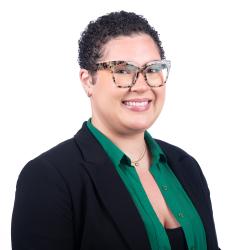
Nikki Starnes
Executive Assistant
Administration and Finance
Length of service at Georgia Tech: 1 year
Renjith Narendranathan Nair
IT Project Manager
Office of Information Technology
Length of service at Georgia Tech: 8 years
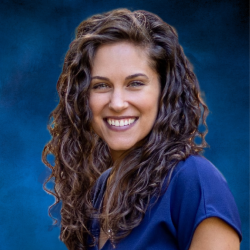
Melissa Storey
BioSpark Labs Laboratory Manager
Real Estate
Length of service at Georgia Tech: 1 year and 3 months
What do you most look forward to in the summer?
Nikki: Being a summer birthday baby means the season always feels a little more special. I look forward to sunshine on my skin, good music in the background, and weekends that feel like mini vacations (preferably poolside).
Renjith: As a family, we're excited for the upcoming USPSA Power Soccer National Conference Cup in Fort Wayne, IN, taking place June 19–22. Our son will be competing in his third season. This is a sport that not too many people are familiar with but is one that is coming into the mainstream. Power Soccer is the only team sport for an athlete with diverse disabilities who needs a power wheelchair to compete and experience the highs of a team sport. You can learn more about it at powersoccerusa.org.
Melissa: The longer daylight hours, the sound of crickets and katydids at night, and vegetables from my garden.
Do you have a favorite summer memory you'd like to share?
Nikki: My first summer in Atlanta was unforgettable — I celebrated a milestone birthday, saw one of my favorite artists live, and spent most weekends exploring the city with friends and soaking up every golden hour.
Renjith: One of our favorite summer memories is from the 2023 Power Soccer National Championship. It was my son Akshay’s first season, and his team proudly took home 3rd place in the Founder's Division. His first goal and the team's overall success made it an unforgettable experience for our entire family. Another highlight of summer is simply spending quality time together—whether it's playing a game of badminton in the driveway, enjoying the outdoors at a park, or sharing a meal.
Melissa: Growing up, we took a camping trip with my extended family every summer. The locale wasn't anything special, but it was always a fun time! I especially remember my grandfather's homemade ice cream.
If you had unlimited time and resources, what would your dream summer look like?
Nikki: I’d pack a carry-on or maybe a few suitcases and disappear to wherever the sun is shining. No deadlines, no alarms — just a passport filled with stamps from beautiful places. I’d collect memories, not emails.
Renjith: I’d be traveling the world with my family, seeking out accessible vacation spots, and embracing life to the fullest through new experiences. And of course, I’d make time for a bit of reading and some video games along the way.
Melissa: It would be one long vacation spent traveling with the intent of enjoying the outdoors: hiking in the mountains to see wildflowers and waterfalls, finding new beaches with good snorkeling spots, and eating as much tasty food as possible along the way.
(text and background only visible when logged in)
April 2025 - Reflections, Focus, and Future Goals
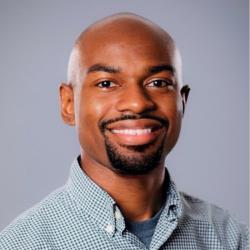
Jalen Smith
Business Intelligence Developer
Administrative Services Center
Length of service at Georgia Tech: 2 years and 11 months
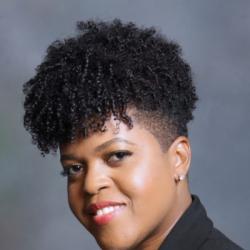
Curlyne Andrew
Associate Director
Bursar and Treasury Services
Length of service at Georgia Tech: 4 years and 2 months

Jermaine Clonths
Associate Director - Utilities Management
Office of Sustainability
Length of service at Georgia Tech: 5 years and 4 months
Name a recent accomplishment you are most proud of?
Jalen: In March, I traveled to New York City with eight students to serve as a staff advisor during their ‘Alternative Service Break’, a program sponsored by Georgia Tech’s Division of Student Engagement & Well-Being. During the week-long venture, we visited four of the five Burroughs (The Bronx, Brooklyn, Queens, and Manhattan), volunteering at soup kitchens, food pantries, and cleaning up shared spaces at non-profit organizations. What I admired most about this experience was the selflessness and positive attitudes that the students exuded the entire time. It was their spring break, and they could’ve chosen to go on vacation, catch up on sleep, or anything else. Instead, this group worked day in and day out, serving others and giving back to those in need. The trip really provided me with a sense of accomplishment and I was proud to stand alongside them!
Curlyne: I am most proud of the successful implementation of the 2024–2025 fee assessment process. For fiscal year 2025, USG approved a tuition rate increase, which included a new third-tier tuition rate. This complex initiative required extensive system updates to ensure accurate assessment for the current academic year.
Jermaine: We recently automated our annual diverted water reporting process, which tracks the amount of potable water Georgia Tech uses that doesn’t return to the sewer system. This report is critical as it helps the institute avoid millions each year in sewer fees. Previously, constructing the report was a tedious, manual task that took about a month to complete. With automation, we can now gather and compile all the necessary data in a couple of weeks.
What are you currently focused on and why is it important?
Jalen: I’m currently working to assist Stacy Whitman, executive director of the Administrative Services Center, as well as my other unit colleagues with reporting needs to provide the best possible insights, in relation to the goals that we are striving toward here at Georgia Tech. Data is important because, not only does it allow us to see and celebrate where we’re doing well, but more importantly, it also provides us with perspective on areas that we need to improve on so that we can address them accordingly and move in the desired direction to be best that we can be.
Curlyne: I am currently serving as chair of a third-party sponsorship subcommittee within RACAR. This effort is important because it aims to streamline processes across the USG system, reduce administrative complexities and most importantly minimize financial barriers for our students.
Jermaine: I'm currently focused on measuring and verifying the performance of our energy efficiency projects. This work is important because it confirms whether a project is actually delivering the energy savings it was designed to achieve. It also allows us to catch any underperformance early on, so we can take corrective action during the warranty period.
What do you look forward to in 2025? Can be future goals and hopeful achievements.
Jalen: I’m looking forward to becoming a stakeholder in the implementation of the New Unified ERP System: Workday. Drawing from my past experience as a team member involved in the previous ERP implementation (OneUSG/PeopleSoft), where we successfully navigated numerous challenges, particularly during the pandemic, I am excited to serve as an advocate and resource in this next chapter! Embracing change isn’t always easy, but when we are unified (pun intended) and can work together more effectively, it makes all the difference, and I’m ready for the challenge!
Curlyne: The exciting start of the 2025–2026 academic year. There's a special energy that comes with the arrival of both new and returning students, the buzz on campus, the renewed sense of purpose, and the opportunity to support our community as they begin or continue their academic journey.
Jermaine: I’m looking forward to sharing data with the Georgia Tech community that highlights the progress we’ve made on key goals outlined in our Institute strategic plan. The Georgia Tech Infrastructure and Sustainability team has completed and continues to deliver projects that conserve energy, increase resilience, reduce emissions, and save money. A lot of this work happens behind the scenes, so I’m excited to help share those accomplishments with others.
(text and background only visible when logged in)
March 2025 - The Power of Collaboration

Gena Snead
Communications Program Manager
Georgia Tech Police Department
Length of service at Georgia Tech: 11 years

David Lyons
Financial Analyst
Grants and Contracts Accounting
Length of service at Georgia Tech: 8 years

Svetlana "Lana" Soroka
Facilities Information Systems Manager
Infrastructure and Sustainability Data Analytics
Length of service at Georgia Tech: 5 years, 9 months
What does effective and efficient collaboration mean to you?
Gena: Effective and efficient collaboration happens when all partners are aligned on a common goal and actively support it. Achieving this requires clear communication, mutual respect, and the ability to harness each team member's unique strengths.
David: With the nature of our office, there are many ways to handle a situation. Effective and efficient collaboration are paramount to how we engage departments, sponsors, and fellow Research Administrators.
Lana: Effective and efficient collaboration for my team means transparent communication and alignment on data requirements. As part of the data analytics team, understanding our customers' needs is essential, as it directly impacts the accuracy and quality of our data analysis and outputs. This, in turn, strengthens our credibility in delivering reliable statistical insights and enables us to explore untouched data sources for deeper analytical opportunities.
Why is it important to collaborate with others?
Gena: Collaboration is essential because it combines talents and ideas, allowing teams to tackle problems more effectively and innovate together. It brings diverse perspectives, balances workloads, and ultimately leads to better outcomes for everyone involved.
David: Regularly communicating with colleagues creates a rapport with them in order to help solve problems. Understanding a situation from another person’s point of view is always a benefit to solving a problem. It also provides opportunities for future assistance and collaborations.
Lana: I would like to share a proverb that perfectly captures the strategic importance of collaboration, ‘If you want to go fast - go alone; if you want to go far - go together.’ It emphasizes the importance of teamwork and building trust in relationships to sustain collective growth in the long-term.
Can you provide an example where you and/or your team collaborated with a team outside of A&F?
Gena: Whether it's through safety programming and education, event security, emergency planning, or more, the Georgia Tech Police Department consistently collaborates with others to ensure campus safety. Last year, I contributed to the collaborative planning of the Helluva Block Party, a major event that changed football operations on game day and required partnerships with various stakeholders beyond Georgia Tech. Key lessons from this collaboration included: the importance of flexibility and adaptability; shared goals drive success; and the need for clearly defined roles and responsibilities.
David: Our team regularly collaborates with other offices outside with A&F because we are central office. We typically deal with contracting, and it creates opportunities to collaborate with people of a different background. It helps us understand the entire picture of the processes.
Lana: Most recently, we implemented a new space inventory management system, replacing one that had been in use for almost 30 years. Bringing this project to a successful completion truly took a collective effort. It required extensive collaboration with numerous Georgia Tech divisions and departments, ranging from research to building services, as well as external consultants to gather requirements, integrate systems, implement the solution, and conduct thorough testing. This experienced helped the team value the importance of patience and persistence, as well as how best to engage stakeholders to learn from one another throughout the process.
(text and background only visible when logged in)
February 2025 - Operational Excellence
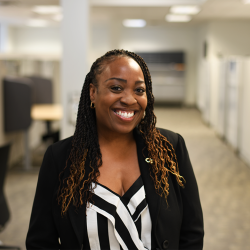
Kira Freeman
Associate Director of Strategy and Administrative Operations
Parking and Transportation Services
Infrastructure and Sustainability
Length of service at Georgia Tech: 10 years

Alicia Wood-Jones
Laboratory and Chemical Safety Officer
Environmental Health and Safety
Infrastructure and Sustainability
Length of service at Georgia Tech: 5 years
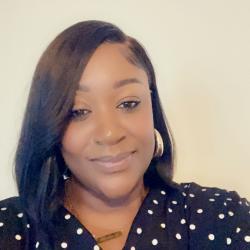
Jihan Charles
Business Analyst Senior
Georgia Tech Human Resources
Length of service at Georgia Tech: 8 years
What does operational excellence mean to you and your team?
Kira: Operational excellence means delivering seamless, efficient, and customer-centric technological solutions that elevate the campus experience. My team prioritizes innovation, strategic problem-solving, and collaborative communication to ensure our services align with the Institute’s core values and the evolving needs of the campus community.
Alicia: Operational excellence means fostering a culture of proactive problem-solving and seamless collaboration across teams and facilities. It ensures that every team member knows exactly who to contact in the event of a lab or building emergency—whether during or after hours. Lab safety is our unwavering priority, no matter the time or nature of the call. Beyond resolving immediate issues, we actively seek community feedback to identify opportunities for improvement and implement solutions that enhance efficiency, responsiveness, and alignment with Georgia Tech’s operational standards.
Jihan: For me and my team, operational excellence is about consistently creating value by identifying areas for improvement, optimizing processes, and ensuring every aspect of the operation supports the broader business strategy and meets customer needs.
How have you achieved operational excellence in the past?
Kira: A major milestone in Parking and Transportation Services' (PTS) commitment to excellence is the implementation of our multi-phased Customer Service Strategic Roadmap. In FY24, we transformed our service delivery model with a customer-focused approach, ensuring every interaction prioritizes empathy, responsiveness, and accuracy. This shift has significantly improved response times, enhanced service precision, and elevated the PTS customer satisfaction rating across campus.
Alicia: Our team has successfully fostered a culture of collaboration by integrating cross-functional teams that include emergency response units, area facilities teams, building managers, principal investigators, and lab managers. By breaking down silos and optimizing multi-departmental processes, we have enhanced coordination, streamlined communication, and improved overall operational efficiency. This approach has allowed us to tackle complex challenges effectively while reinforcing a shared commitment to safety and excellence.
Jihan: One of my key achievements includes the development of the Performance Management @Tech Workspace (PM@Tech). In collaboration with the Office of Information Technology (OIT) and Georgia Tech Human Resources (GTHR) stakeholders, we successfully implemented the PM@Tech workspace, which significantly improved the efficiency of tracking staff performances across campus. This tool streamlined the performance management process for staff employees and contributed to a more seamless operation.
What do you plan to do to achieve operational excellence moving forward?
Kira: We are enhancing efficiency, accuracy, and data-driven decision-making by leveraging cutting-edge technology to optimize operations and service delivery. A key initiative in this transformation is the implementation of Zendesk, a customer relations ticketing system for PTS, replacing outdated email and landline-based interactions. This platform will streamline inquiries, requests, and dispatch operations, improving scalability, workflow integration, and service tracking. By strengthening cross-functional collaboration and utilizing analytics-driven insights, we are committed to elevating customer satisfaction and maximizing operational effectiveness.
Alicia: Moving forward, we plan to leverage automation tools such as Power BI to streamline repetitive tasks, allowing our team to focus on high-impact activities like laboratory inspections, safety consultations, and training initiatives. Additionally, we will continue prioritizing ongoing professional development to ensure our team remains equipped with the latest skills and best practices. By fostering adaptability and continuous improvement, we aim to enhance efficiency, responsiveness, and overall safety across our operations.
Jihan: I plan to continue to collaborate with stakeholders in units across campus and OIT in order to meet our customer needs and to leverage innovations in technology. Additionally, I will focus on accurately capturing customer business requirements to ensure they align with Georgia Tech’s strategic objectives. By gaining a clear understanding of stakeholder needs, I can propose solutions that deliver maximum value and enhance operational efficiency.

